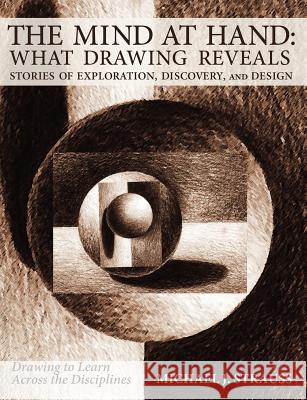The Mind at Hand: What Drawing Reveals: Stories of Exploration, Discovery and Design » książka
The Mind at Hand: What Drawing Reveals: Stories of Exploration, Discovery and Design
ISBN-13: 9781612336329 / Angielski / Miękka / 2013 / 240 str.
The Mind at Hand explores how artists, scientists, writers, and others - students and professionals alike - see their world, record it, revise it and come to know it. It is about the rough-drawn sketch, diagram, chart, or other graphic representation, and the focus these provide for creative work that follows from them. Such work could involve solving a problem, composing a musical score, proposing a hypothesis, creating a painting, and many other imaginative and inventive tasks. The book is for for visual learners of all kinds, for scientists as well as artists, and for anyone who keeps a journal, notebook, or lab book in order to think and create visually. It is also a book for teachers and educational administrators interested in learning about new active learning strategies involving drawing, and possible outcomes of these in classrooms. The formulas and symbols of chemistry, the diagrams and features of the landscape in geology, and the organisms and structures in biology, are all represented as images on pages or screens. Students create them when studying, problem-solving, and learning. Once in front of their eyes, they can be reconsidered, revised, and reconstructed into new images for further consideration and revision. It is how artists often create a painting or a sculpture, and how scientists come up with new hypotheses. This is how learning occurs, not only across disciplines, but in all kinds of creative endeavors, through a continuing process of creation, revision, and re-creation. It is drawing-to-learn.
The Mind at Hand explores how artists, scientists, writers, and others - students and professionals alike - see their world, record it, revise it and come to know it. It is about the rough-drawn sketch, diagram, chart, or other graphic representation, and the focus these provide for creative work that follows from them. Such work could involve solving a problem, composing a musical score, proposing a hypothesis, creating a painting, and many other imaginative and inventive tasks.The book is for for visual learners of all kinds, for scientists as well as artists, and for anyone who keeps a journal, notebook, or lab book in order to think and create visually. It is also a book for teachers and educational administrators interested in learning about new active learning strategies involving drawing, and possible outcomes of these in classrooms. The formulas and symbols of chemistry, the diagrams and features of the landscape in geology, and the organisms and structures in biology, are all represented as images on pages or screens. Students create them when studying, problem-solving, and learning. Once in front of their eyes, they can be reconsidered, revised, and reconstructed into new images for further consideration and revision. It is how artists often create a painting or a sculpture, and how scientists come up with new hypotheses. This is how learning occurs, not only across disciplines, but in all kinds of creative endeavors, through a continuing process of creation, revision, and re-creation. It is drawing-to-learn.











